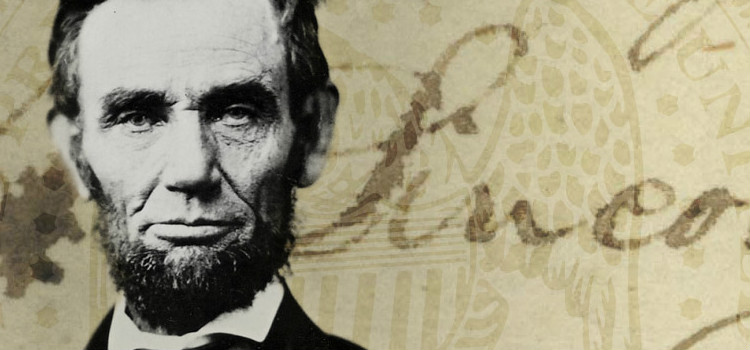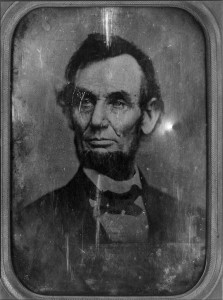
Lincoln, the peacemaker, was not a peacekeeper.
On this day of April 15th, 149 years ago, Abraham Lincoln was assassinated. The innumerable people who have been impacted by his life and legacy in years past and those who have yet to be touched is a testament to an extraordinary life. What was unique about Lincoln that enabled him to impact a nation and multiple generations? He was the peacemaker instead of a peacekeeper.

His dream to be president was finally realized on November 6, 1860 he was elected the 16th president of the United States of America. However, within weeks of the election it was announced that South Carolina adopted an ordinance of secession immediately followed by Florida, Mississippi, Alabama, Georgia, Louisiana, and Texas. Before he arrived in Washington for his inauguration on March 4, 1861, the aforementioned southern states formed the Confederate States of America, adopted a constitution, appointed their president Jefferson Davis, and declared their status as a new sovereign nation.
This crisis was what Abraham Lincoln stepped into when he stepped onto the national stage as president. Six weeks later Confederate soldiers attacked and forced the surrender of federal forces at Fort Sumter in the harbor of Charleston, South Carolina and four more states joined the Confederacy. First the United States was divided, now it was at war with itself.
Pro-Choice or Pro-Life
Efforts at compromise had failed and Lincoln’s election was the final straw. America’s foundations had been eaten alive like a hidden cancer and Lincoln’s election brought the hideous disease and contentious slavery issue out into the open. The proponents of slavery declared that freedom of choice was the cornerstone of American democracy. Lincoln, on the other hand, proclaimed that there was a higher law: A man’s freedom of choice ceased the moment that choice affected another man’s freedom (Marshall & Manuel, 1997, p. 458).
Taken to the extreme, pro-choice doctrine claimed, in effect, that people could do anything they wanted to, without regard to others. “Yet the very essence of moral self-government required that the people maintain constant vigilance to preserve and protect the God-given, inalienable rights of all people. …The Declaration of Independence defined these rights and embodied this vision” (Marshall & Manuel, 1997, p. 459).
History regards Lincoln as one of the most revered and beloved American presidents. He hated the injustice of slavery and led the battle to preserve the union whatever the cost. His perseverance has been celebrated and the extensive failures he overcame have been detailed extensively. Although some of the failures have been exaggerated and misrepresented it is true that Lincoln overcame great adversity in his life; enduring great hardships, disappointments, and failures.
It is well known that Lincoln rose from humble origins, born in a one-room log cabin but it is not so well known that he lost many loved ones. At the formative age of nine his mother died followed by his sister when she gave birth to a still born child. He also lost a very close friend (who was rumored to be his fiancé), and three of his four children; one died at the age of 4; one at the age of 12 (while he was president in 1862); and one at the age of 18.
Building a Legacy
Many stories attest to Lincoln’s integrity and the cost he paid to build his reputation as “Honest Abe”. For example a business venture which he began with a friend failed and when the debt was due on the note the next year Lincoln was unable to pay and all of his possessions were seized by the Sheriff. When Lincoln’s former partner died soon after, he insisted on assuming his debt even though Lincoln was not legally obligated to do so. He was finally able to pay off this debt thirteen years later. Lincoln knew that his reputation was invaluable and was willing to pay a price that most men would have avoided.
In Lincoln’s time senators were not elected by direct popular vote but nominees were appointed by the state legislature. He publicly made it known in 1854 that he was seeking the appointment. In the first ballot taken by the general assembly Lincoln received the most votes but was six votes shy of the requisite majority. After another 8 ballots the vote remained deadlocked. Finally, Lincoln withdrew from the race choosing to support another candidate so as to ensure that the Senate seat did not go to a pro-slavery Democrat. It took considerable strength and humility for Lincoln to step down, sacrificing his personal ambitions for the greater battle of justice and equality for colored people. This action reverberated publicly and preceded Lincoln on his journey to the Whitehouse. His commitment to freedom was underscored.
Fortitude
The fabric of Lincoln’s life was woven with threads of failure and success in such a way that like chain mail he wore a suit of armor enabling him to not only attain the presidency during the greatest crisis in American history, but lead a nation through a civil war, preserving the union when a lesser man or woman would have failed. In many ways by the time he became President he had already endured more than most people could imagine. He had the fortitude to become a peacemaker, making peace in America by leading the Union to war against the Confederacy instead of being a peacekeeper, keeping peace and compromising on the issue of slavery. The very thing that almost destroyed Lincoln, namely, his journey to the white house, was also the very thing that perfectly prepared him for a mission that would have caused other men to wilt and wither.
His biggest problem was his greatest opportunity.
The Civil War ended in 1865, after four long years, costing the lives of over half a million Americans, and President Lincoln’s own life. But, the American Union was saved, the slaves were freed, and President Lincoln’s lifelong dream was realized.
What insurmountable obstacles do you face? What has almost destroyed you?
How could your difficult journey be the very thing that is preparing you for your mission?
It takes fortitude to be the peacemaker instead of a peacekeeper. True peace sometimes necessitates going to war instead of compromising. Remember, your biggest problem is your greatest opportunity.
References: Marshall, P., & Manuel, D., (1997). Sounding forth the Trumpet. Grand Rapids, MI: Fleming H. Revell.
